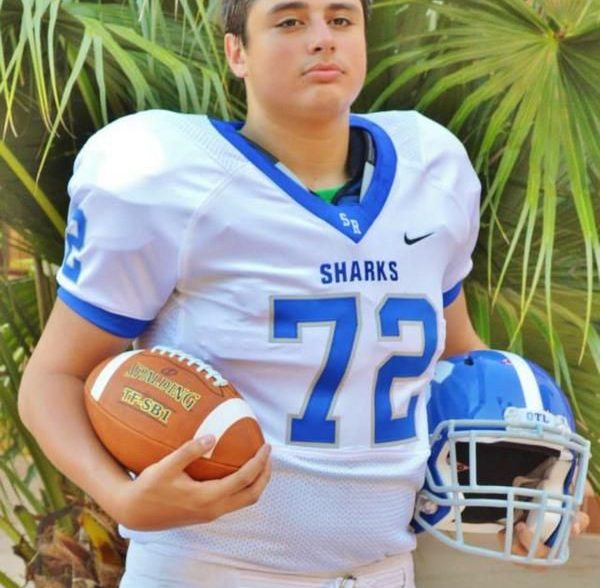
INDIAN RIVER COUNTY — Indian River County School District spokesman Bill Fritz said the district has not received any official comments or questions from parents about the heat-related death of a student at a football training camp in August and that no changes in athletic training procedures are planned.
“We follow the Florida High School Athletic Association (FHSAA) procedures,” Fritz said. “They have a procedures handbook and we follow them accordingly.”
“Manner of death: accident. Cause of death: heat stroke.” With those nine words from the autopsy report, the investigation into the tragic Aug. 13 death of 14-year-old William Shogran Jr. was officially closed.
Shogran collapsed during practice with the Sebastian River High School football team at Camp Blanding in North Florida. His temperature was recorded at 107 degrees.
The autopsy, performed by Dr. William Hamilton found: “no potentially lethal injuries or disease process; toxicology studies negative for chemical intoxication.”
The home-schooled student had recently enrolled in SRHS in order to obtain additional required credits.
With his parents, Shogran had considered several sports possibilities and decided on football. To prepare, Shogran, a video gamer who was, according to official reports, rarely physically active and an allergy sufferer since early childhood, worked out on exercise equipment at home and drank protein shakes.
The school’s pre-participation physical evaluation, required before joining the football team, stated that Shogran was allergic to dairy and soap, and, on the day of the evaluation, had rash on his arms due to the soap allergies.
No other areas of concern were mentioned.
In the 32-page death investigation report from the Clay County Sheriff’s Office and the Alachua County Medical Examiner were statements from Shoran’s parents indicating he had been “observed in church lose all color in his face, and began sweating excessively” and was also “said to have not been feeling well leading up to the football camp” and vomiting a clear fluid while at home.. . . .no other signs of illness or concern were observed by family members prior to departing for camp.”
On the morning of the incident, Shogran participated in a 30-minute 6:15 work-out session – “dawn patrol” – for players who had not been able to attend summer workouts, prior to camp.
After breakfast, the team rested in the barracks from 7:30 to 9 a.m. prior to morning practice.
At that time, Shogran vomited, but told Coach David Pettis he had “drank too much water too fast.”
According to the report, due to the heat, Pettis had adjusted the 30-minute practice/10 minute rest and water break to a 20-minute practice, with 10 minute breaks, which the team members confirmed in their statements.
The temperature at the time of morning practice was said to be 79 degrees.
Sworn statements from all coaches and teammates were taken: Teammates recalled Shogran vomiting and saying he didn’t feel well prior to practice, but didn’t inform the coach at that time.
Later, Shogran became dizzy and headed to the sidelines where he told Pettis he felt as if he were going to pass out, whereupon all the coaches came to his aid and 911 was called.
Shogran was transported to Shands Hospital in Starke, where he was pronounced dead.
Asked whether any comments had been received from parents relating to the incident or the team’s heat procedures and whether the school is considering any related procedural changes, SRHS Athletic Director Michael Stutzke referred to School District Communications Officer Bill Fritz.
Fritz stated that, according to Stutzke, the school has “not received any parent comments relating to the heat procedure, but we’ve, of course, had ongoing interaction, (regarding) memorials” and such.
He said the district scrupulously follows the Florida High School Athletic Association (FHSAA) procedures handbook.
He also said, “Yes, some review has occurred. We feel comfortable at this point . . . we will continue to follow the FHSAA procedures.”
Corey Sobers, FHSAA Spokesperson, said, “We have advisory committees for each sport that can make recommendations for sport-specific policy changes and that would typically be the starting point. I am not aware of a movement to change that policy but our Sports Medicine Advisory Committee is constantly working, particularly on the areas of heat-related illness and concussions to educate and recommend policies to keep our student-athletes as safe as possible. There is a heat acclimatization policy within the handbook.”
The policy to which Sobers refers is lengthy and comprehensive, covering all aspects of heat-related events in detail, and including strict sanctions for non-compliance.
According to the Annual Survey of Football Injury Research, produced through the University of North Carolina at Chapel Hill, in 2013 seven of the nine reported high school football deaths in the U.S. were heat-related.
Last month, ESPN.com correspondent Stephania Bell wrote, “The past week has been a tragic one in high school football. Within seven days, three players died – two after collision injuries, a third untouched during warm-ups. The proximity of these deaths and the common thread of football raise questions for some people about the sport’s safety.”



